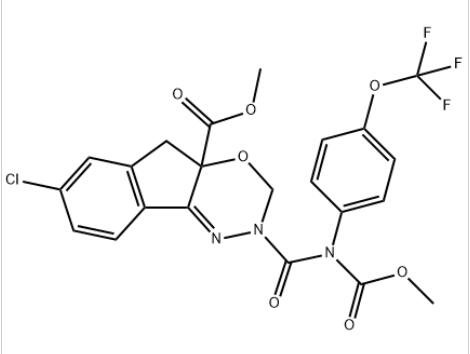Industry News
-

Insecticide: action characteristics and control objects of indamcarb
Indoxacarb is an oxadiazine insecticide developed by DuPont in 1992 and marketed in 2001. → Scope of application: It can be used for the prevention and control of most lepidopteran pests (details) on vegetables, fruit trees, melons, cotton, rice and other crops, such as diamondback moth, rice...Read more -
Analysis on the Development Trend of Nematicides
Nematodes are the most abundant multicellular animals on the earth, and nematodes exist wherever there is water on the earth. Among them, plant parasitic nematodes account for 10%, and they cause harm to plant growth through parasitism, which is one of the important factors that cause major econo...Read more -
How to prevent and control tobacco shredded leaf disease?
1. Symptoms Broken leaf disease damages the tip or edge of tobacco leaves. The lesions are irregular in shape, brown, mixed with irregular white spots, causing broken leaf tips and leaf margins. In the later stage, small black spots are scattered on the disease spots, that is, the ascus of the pa...Read more -

Triadimefon will usher in a new era for herbicide market in rice fields
In the herbicide market of rice fields in China, quinclorac, bispyribac-sodium, cyhalofop-butyl, penoxsulam, metamifop, etc. have all led the way. However, due to the long-term and extensive use of these products, the problem of drug resistance has become increasingly prominent, and the loss of c...Read more -
Characteristics and control measures of root-knot nematodes
As the temperature decreases, the ventilation in the room decreases, so the root killer “root knot nematode” will harm crops in large quantities. Many farmers report that once the shed becomes sick, they can only wait to die. Once root-knot nematodes occur in the shed, do you have to...Read more -
It only takes two minutes for aphids and thrips, this formula is efficient and cheap!
Aphids, leafhoppers, thrips and other piercing-sucking pests are seriously harmful! Due to high temperature and low humidity, it is especially suitable for the reproduction of these small insects. Once the control is not timely, it will often cause serious effects on crops. Today I will introduc...Read more -
What should I do if the ground temperature is low in winter and the root activity is poor?
The winter temperature is low. For greenhouse vegetables, how to increase the ground temperature is the top priority. The activity of the root system affects the growth of the plant. Therefore, the key work should still be to increase the ground temperature. The ground temperature is high, and th...Read more -
Are red spiders difficult to control? How to use acaricides more efficiently.
First of all, let’s confirm the types of mites. There are basically three types of mites, namely red spiders, two-spotted spider mites and tea yellow mites, and two-spotted spider mites can also be called white spiders. 1. Reasons why red spiders are difficult to control Most growers do no...Read more -
Progress in Evaluation of Pesticide Endocrine Disruptors in EU
In June 2018, the European Food Safety Agency (EFSA) and the European Chemical Administration (ECHA) released the supporting guidance documents for the identification standards of endocrine disruptors applicable to the registration and evaluation of pesticides and disinfectants in the European Un...Read more -
Pesticide compounding principles
Mixed use of pesticides with different poisoning mechanisms Mixing pesticides with different mechanisms of action can improve the control effect and delay drug resistance. Pesticides with different poisoning effects mixed with pesticides have contact killing, stomach poisoning, systemic effects, ...Read more -
What to do if yellow spots appear on corn leaves?
Do you know what the yellow spots that appear on corn leaves are? It’s corn rust!This is a common fungal disease on corn. The disease is more common in the middle and late stages of maize growth, and mainly affects maize leaves. In severe cases, ear, husk and male flowers can also be affect...Read more -
Are red spiders difficult to control? How to use acaricides more efficiently.
First of all, let’s confirm the types of mites. There are basically three types of mites, namely red spiders, two-spotted spider mites and tea yellow mites, and two-spotted spider mites can also be called white spiders. 1. Reasons why red spiders are difficult to control Most growers do ...Read more




